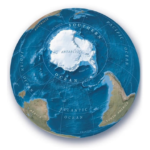
Key Points:
- Excessive groundwater extraction between 1993 and 2010 has caused Earth’s rotational pole to drift by 80 cm eastward, with India being a significant contributor.
- Groundwater pumping redistributed 2,150 gigatons of water from aquifers to oceans, raising sea levels by 0.24 inches.
- Long-term impacts could affect Earth’s climate systems, highlighting the need for sustainable water management.
How Does Groundwater Depletion Affect Earth’s Axis?
The study, led by Ki-Weon Seo from Seoul National University, links the Earth’s rotational pole drift to massive groundwater extraction. This polar drift, known as polar motion, is influenced by changes in Earth’s mass distribution. Regions like northwestern India and western North America have been key contributors due to extensive groundwater use.
The redistribution of groundwater alters Earth’s balance, exerting a greater impact on polar drift than even ice sheet melting, previously considered a major factor. While the tilt of 31.5 inches doesn’t immediately affect weather patterns or seasons, its long-term consequences on climate systems remain a concern.
The Bigger Picture: Why Should We Care?
This finding underscores the interconnectedness of human activities and planetary dynamics. The tilt caused by groundwater depletion emphasizes how unsustainable resource use can disrupt Earth’s physical processes. It serves as a wake-up call for policymakers and environmentalists to:
- Promote water conservation: Implement strategies to reduce groundwater extraction.
- Adopt sustainable farming: Agriculture is a major water consumer, especially in India.
- Strengthen global cooperation: Address groundwater management as part of climate change mitigation.
What Lies Ahead?
If left unchecked, continued groundwater extraction could worsen polar motion and potentially affect Earth’s climate systems over geological timescales. Could conservation efforts shift Earth’s trajectory back? While it’s a daunting challenge, this research highlights the importance of sustainable resource management to mitigate future impacts. Will global action rise to meet this pressing need?




































Leave a Reply